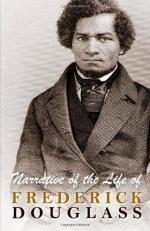My master and myself had quite a number of differences. He found me unsuitable to his purpose. My city life, he said, had had a very pernicious effect upon me. It had almost ruined me for every good purpose, and fitted me for every thing which was bad. One of my greatest faults was that of letting his horse run away, and go down to his father-inlaw’s farm, which was about five miles from St. Michael’s. I would then have to go after it. My reason for this kind of carelessness, or carefulness, was, that I could always get something to eat when I went there. Master William Hamilton, my master’s father-in-law, always gave his slaves enough to eat. I never left there hungry, no matter how great the need of my speedy return. Master Thomas at length said he would stand it no longer. I had lived with him nine months, during which time he had given me a number of severe whippings, all to no good purpose. He resolved to put me out, as he said, to be broken; and, for this purpose, he let me for one year to a man named Edward Covey. Mr. Covey was a poor man, a farm-renter. He rented the place upon which he lived, as also the hands with which he tilled it. Mr. Covey had acquired a very high reputation for breaking young slaves, and this reputation was of immense value to him. It enabled him to get his farm tilled with much less expense to himself than he could have had it done without such a reputation. Some slaveholders thought it not much loss to allow Mr. Covey to have their slaves one year, for the sake of the training to which they were subjected, without any other compensation. He could hire young help with great ease, in consequence of this reputation. Added to the natural good qualities of Mr. Covey, he was a professor of religion—a pious soul—a member and a class-leader in the Methodist church. All of this added weight to his reputation as a “nigger-breaker.” I was aware of all the facts, having been made acquainted with them by a young man who had lived there. I nevertheless made the change gladly; for I was sure of getting enough to eat, which is not the smallest consideration to a hungry man.
CHAPTER X
I had left Master Thomas’s house, and went to live with Mr. Covey, on the 1st of January, 1833. I was now, for the first time in my life, a field hand. In my new employment, I found myself even more awkward than a country boy appeared to be in a large city. I had been at my new home but one week before Mr. Covey gave me a very severe whipping, cutting my back, causing the blood to run, and raising ridges on my flesh as large as my little finger. The details of this affair are as follows: Mr. Covey sent me, very early in the morning of one of our coldest days in the month of January, to the woods, to get a load of wood. He gave me a team of unbroken oxen. He told me which was the in-hand ox, and which the off-hand one. He then tied the end of a large rope around the horns of the in-hand ox,




